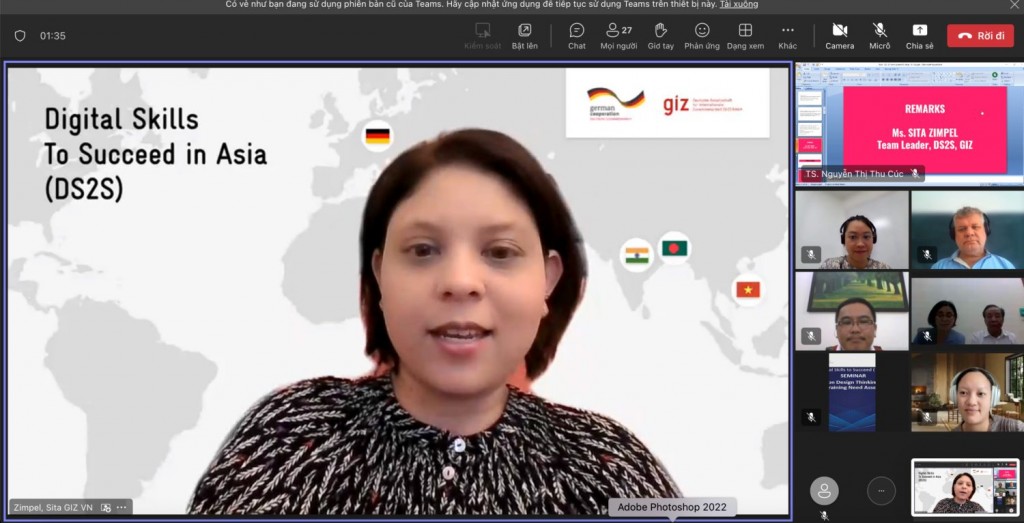On September 16, 2024, the National Academy of Public Administration (NAPA), in collaboration with the German Corporation for International Cooperation (GIZ), organized a seminar titled “Introduction on Design Thinking and the Plan for Training Need Assessment”. Dr. Nguyen Dang Que, NAPA Vice President, delivered remarks at the seminar.
The seminar was held in an online format, with the participation of delegates and guests: Ms. Sita Zimpel, Team Leader of the “Digital Skills to Succeed” (DS2S) Project, GIZ; Dr. Pham Thanh Thao, senior lecturer and consultant; Mr. Olivier Lefevre, lecturer and expert in design thinking, analysis, and problem-solving. On the side of NAPA, participants included representatives of the Department of International Cooperation, Department of Graduate Training Management, NAPA Ho Chi Minh City Campus, members of the Coordinating Committee, and lecturers from the branch involved in the “Design Thinking” training course; as well as representatives from several universities participating in the DS2S0 Project.
In his remarks at the seminar, Dr. Nguyen Dang Que, NAPA Vice President, emphasized the need for universities to fulfill their role in training high-quality human resources in the digital age. Universities must equip students with appropriate digital competencies, enabling them to adapt to and master technology, actively participate in the digital transformation process, and be flexible in the face of changes in the labor market. The DS2S project, therefore, has a practical significance as it provides students with digital skills through micro-credentials designed and implemented by participating institutions. This also encourages innovation in teaching approaches, the application of technology, and particularly the use of design thinking in the renewal of programs and teaching content, contributing to the continuous improvement of the quality of micro-credential courses on digital skills.
Within the framework of the seminar, NAPA hopes to share insights related to design thinking and its application in renewing training programs. Additionally, it seeks feedback from the delegates regarding the plan to assess training needs, based on which a proposal can be made for a faculty development program on “Applying design thinking in developing learner-centered training programs.”
Speaking at the seminar, Ms. Sita Zimpel, Team Leader of the DS2S Project, expressed her sincere thanks for the close cooperation of NAPA and the universities involved in the meaningful activities within the project. She also expressed her hope for continued collaboration and support during the survey process to achieve the set objectives.
Sharing more about the DS2S project, she noted that this is a regional project being implemented in three countries, namely Viet Nam, India, and Bangladesh. The project is carried out by GIZ on behalf of the German Federal Ministry for Economic Cooperation and Development (BMZ). The goal of the project is to enhance the digital skills of university students by promoting cooperation between universities in the region as well as with universities in Germany, thereby developing micro-credential programs focused on digital skills.
In Viet Nam, the project is particularly focused on how to equip students with digital skills that meet the demands of future jobs, specifically in the fields of economics, commerce, and the public sector. Within the framework of the project’s activities, NAPA has been assigned to lead the design of a faculty development program on “Applying design thinking in developing learner-centered training programs.” Since June 2024, NAPA has organized numerous faculty development activities on design thinking and its application in program innovation.
The seminar is an important activity within the project, covering the following main topics:
(1) An overview introduction to design thinking;
(2) Introduction to the faculty development program on applying design thinking skills in developing learner-centered programs;
(3) Introduction to the training need assessment activity for applying design thinking in developing learner-centered programs.

Mr. Olivier Lefevre, lecturer and expert in design thinking, analysis, and problem-solving, at the seminar.
In the report at the seminar, Pham Thanh Thao, senior lecturer and consultant, and Mr. Olivier Lefevre, lecturer and expert in design thinking, analysis, and problem-solving, presented and introduced topics related to the core concepts of design thinking. Emphasizing that design thinking is a behavior, the two experts shared success stories of design thinking, the process of operating design thinking, and perspectives from a design thinking approach. The benefits of design thinking include making a lasting impact on students’ success by “revolutionizing” teaching methods, focusing on the learner, allowing teachers to explore innovative strategies, boost student engagement, and achieve educational excellence; fostering collaboration across different departments and discipines, thus enhancing the overall educational experience. Additionally, design thinking helps improve professional skills, better preparing students for their successful careers after graduation. Among the top 10 professional skills, design thinking methods improve (1) Analytical thinking and innovation; (2) Creativity, originality, and initiative; (3) Critical thinking and analysis; and (4) Complex problem solving.
Delegates at the seminar exchanged and discussed useful information to strengthen and refine the content outlined in the plan to assess the training needs of lecturers regarding design thinking. The main objective proposed is to identify and prioritize the specific needs of each university participating in the project. Furthermore, a tailored approach was suggested to ensure the plan aligns with the specific context and requirements of each organization by providing detailed information from data to effectively adjust the plan. The two pillars of the needs assessment plan were identified as qualitative and quantitative data based on the results of in-depth interviews and surveys conducted.
The German Corporation for International Coopration (GIZ) is a federally-owned organization that operates globally, with over 40 years of experience in international cooperation, including 25 years working in Viet Nam. GIZ provides its partners with regional knowledge, extensive expertise, and practical organizational management experience aimed at promoting sustainable development worldwide.







![[Register Today!] Inclusive and Participatory Methods for Policy Making, 12 to 15 Nov unnamed (1)](http://www1.napa.vn/en/wp-content/uploads/sites/2/2024/09/unnamed-1-75x75.png)
